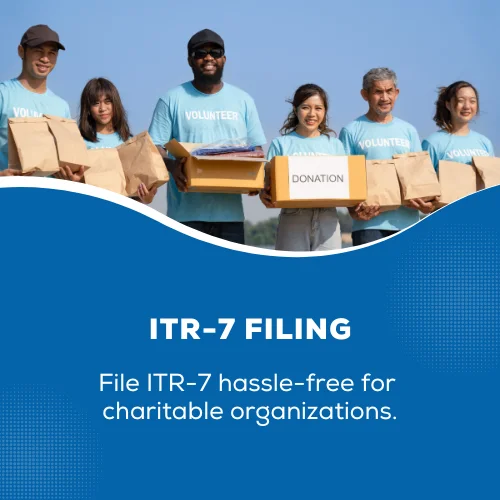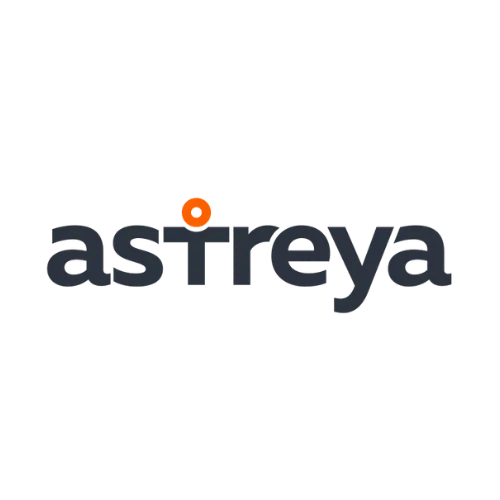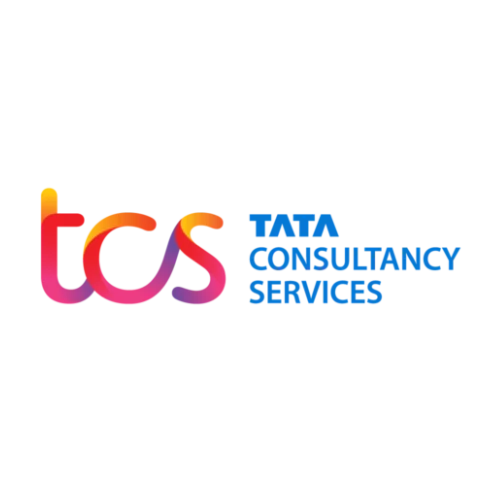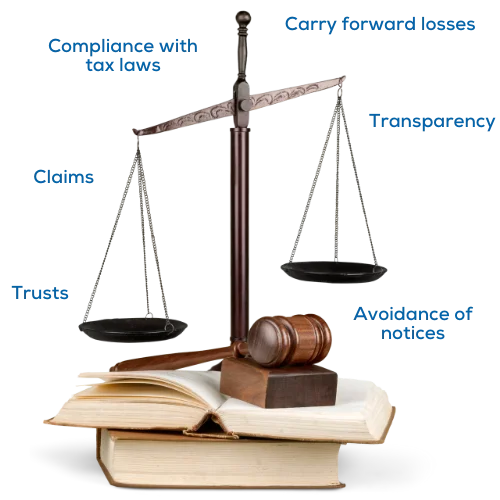ITR-7 Filing
ITR-7 Filing for Trusts, NGOs & Charitable Institutions – Made Easy!
It helps these organizations report income, claim exemptions, and maintain transparency for compliance and funding purposes.

Let Us Handle Your Tax Compliance – Start Now!
- Get Instant Quote
What’s Included ✅
- Consultation on Eligibility & Applicability of ITR-7
- Preparation & Online Filing of ITR-7 Form
- Computation of Income & Claiming Exemptions under Section 11, 12, etc.
- Preparation of Financial Statements (if required)
- Audit Report (Form 10B/10BB) Filing Assistance
- Acknowledgment & E-Verification Support

Exclusive Free Benefits 🎁
- Free check if your NGO/Trust needs to file ITR-7 – no confusion.
- Free guidance on claiming tax exemptions – save more for your cause.
- Free compliance checklist (PDF) – stay ready for audits or renewals.
- Free consultation on 12A & 80G Registration – enhance donor trust.
- One free consultation call on annual compliance planning – smooth filing every year.
- Consultation with CA/CS/Advocate Free for Lifetime
10,000+ Companies & Individuals Put Their Trust In Us
























✅ Clear Guidance: They explained every step in simple, easy-to-understand terms, so I always knew what was happening.
✅ Fast & Efficient: My filing was completed quickly without any unnecessary delays.
✅ Accuracy & Trust: I felt confident knowing my details were handled with care and precision.
✅ Great Support: Any small questions I had were answered patiently and thoroughly.
ITR 7 Form For Income Tax Return Filing Online
It is an essential compliance requirement for individuals and various entities who earn income in India to file Income Tax Return. Different ITR Forms have been prescribed by the Income Tax Return for different taxpayers as per their income sources and organizational structure. This form is specifically designed for some certain categories of taxpayers including trusts, political parties, religious institutions, educational institutions, and charitable institutions. You should choose the correct ITR form wisely in order to comply with tax regulations and safeguard your financial interests.
Understand everything about ITR 7 properly with the help of top online income tax return filing portals like Click To Professionals.

What is ITR 7 Form?
Benefits of Filing ITR 7
Compliance With Tax Laws
Income Tax Return Filing will make sure that you meet legal obligations as well as to avoid penalties.
Carry Forward Losses
With the help of Income Tax Return Filing (ITR 7) you can carry forward losses in order to set off in subsequent years.
Easy Approval of Loan and Visa Applications
You can submit the receipts of ITR 7 as the proof of income for the facilitation of loan approvals and visa applications.
Claim Income Tax Refunds
If you file an Income Tax Return, you can claim refunds for excessive TDS or advance tax paid.
Avoidance of Notices
If you file Income Tax Return properly, you can minimize the chances of income tax notices.
Transparency
If you file the returns properly in detail, it will make sure about financial transparency and compliance.
Compliance With Tax Laws
Carry Forward Losses
Easy Approval of Loan and Visa Applications
Claim Income Tax Refunds
Avoidance of Notices
Transparency
Who is Eligible to File ITR 7?
We will provide you with a general understanding of who is typically eligible to file ITR 7 form in India. The ITR 7 form in India is primarily meant for the individuals and some specific entities. Here are the key eligibility criteria for filing ITR 7. Specific entities eligible to file this specific form ITR 7 are as given below:
- Entities that derive income from properties that are held under trust for charitable or religious purposes including NGOs or Non-Profit Organizations, Religious Trusts, Charitable Institutions, Welfare Properties as per Section 139(4A) of the Income Tax Act.
- Political Parties that have been registered under 29A of the Representation of the People Act, 1951 with total income, before claiming exemption under Section 13A, exceed the basic exemption limit.
- Certain institutions including scientific research institutions, news agencies, educational institutions like universities & colleges, and hospitals & medical institutions if their income exceeds the basic exemption limit.
- As per section 139(4D) institutions including universities, colleges, or other educational institutions that do not require an audit but still need to file an Income Tax Return must have to file ITR 7 form.

Income Tax Return Due Date
- The Income Tax Return last date for filing ITR 7 is typically the same as for other forms, providing protection from penalties for late filing.
- Usually the last date of filing ITR 7 will be 31st July until there are any changes made by the government.
- Audit Requirement: In case, if an entity has a turnover of Rs. 1 Crore or more (for businesses) or Rs. 50 Lakhs or more (for professionals), a tax audit is mandatory as per section 44AB.
Structure of ITR 7 Form
- Part A: General Information
- Part B: Deductions and Total Taxable Income
- In this section you have to mention about the numerous deductions applicable to you including deductions under section 80D, 80C, 80G, etc.
- You also have to mention the total taxable income after deductions.
- Part C: Tax Computation and Tax Status

- Taxes Paid & Verification
This section includes details of TDS i.e. Taxes Deducted at Source, advance tax and self-assessment tax paid. It also consists of verification and signature of the taxpayer.
- Schedules
This section consists of various schedules that include different income, deductions, and exemptions.
Income Tax Return Process
The process of Income Tax Return includes a number of tricky steps. You should have to understand its process properly for which you can seek the professional guidance of expert ITR filing consultants. The major steps are as given below:
Firstly, you have to visit the official website of e- filing of income tax return which is https://www.incometax.gov.in/iec/foportal/
- After login, if you are a first time user you have to register yourself.
- If you are the repeat user you have to log in to the website.
- You have to enter your PAN as your user id and then click ‘Continue’.
- You have to check the security message given in the tick box.
- Then, you have to enter your password & click on the ‘Continue’ button.
After logging in, you will see the e- file menu on the menu bar. When you click on the e – file menu then, you will get the option of ‘Income Tax Returns’ on clicking which you will see the option of ‘File Income Tax Return’ and you have to click on that option.
You will be redirected to the page of Income Tax return where you have to select the ‘assessment year’ and the ‘mode of filing’ for which you wish to file the income tax return and then you have to click on ‘Continue’.
After that, you have to select the status of filing ITR as Individual and click on ‘Continue’.
- Personal information: Your basic details including your full name, PAN, Aadhaar Number, contact details, bank account details.
- Gross total income: You have to enter & verify your total income from all the sources along with the details of exempt income.
- Total deductions: The information about the deductions that you need to be claimed under the different sections.
- Tax paid: Reflects the tax paid by you from all the sources but not been limited to TDS, TCS, Advance Tax & Self – assessment
- Total tax liability: This section reflects the total tax liability as per the information provided by you previously. If the amount is negative then it can be claimed as the refund and if the amount is positive then you have to pay the following amount as tax.
You have to choose the reason for filing the ITR. You have to select the correct option that has been applicable to your situation:
- Taxable income is more than the basic exemption limit
- Meets specific criteria & compulsory requirement of filing the ITR
- Others
You need to add your bank details. If already submitted, then you have to make sure that it has been pre- validated. You have to review the correctness of pre- filled information that has appeared on the new page.
Your screen will display the summary of the tax computation according to your given information and you will get to know if you have to pay any tax or you are eligible for a tax refund. Then, you have to enter the place of your residence to preview and submit your ITR.
E- Verification of ITR is the most crucial step. Your Income Tax Return will be incomplete until you verify it. You have the option to e – verify the ITR via Aadhaar OTP, Net banking EVC i.e. Electronic Verification Code or by sending a physical copy of ITR to CPC Bengaluru.
At last, you have to click on the ‘Submit’ button to submit your ITR. After submission you will get the acknowledgment from the Income Tax department at your given email id.
Find a local agent for your legal & registration service
+91 8448094507
Phone No.
info@clicktoprofessionals.com
Get Support
Essential Documents Required to File ITR 7
- PAN Card of Entity
- Registration Certificate (for trusts, NGOs, Political Parties, etc.)
- Income and Expenditure Statements
- Bank Account Statements
- Audited Financial Statements (if applicable)
- Details of Grants, Donations, and Exempt Income
- 12A & 80G Registration Certificate (for NGOs)
- TDS Certificates (Form 16A and 26AS, etc.)
- Form 10B (for charitable trusts that claim exemption under section 11 and 12)
- Other Supporting Documents

Key Points to Remember While Filing ITR 7
You should take care of some of the key considerations while filing income tax return with the help of ITR 7 which are as given below:
You should have to double-check all the details before submission in order to avoid errors and penalties.
Common Mistakes to Avoid While Filing ITR 7
Although the process of filing ITR 7 is very simple, still you have to take care of some mistakes that you should avoid while filing this form. Such common mistakes are as given below:
Filing the Wrong Form
You have to make sure that you should meet the eligibility criteria for ITR 7 before proceeding.
Mismatch in Income Details
It will be better to cross-verify the details in Form 16 and Form 26AS and bank statements with the information entered in ITR.
Incorrect Personal Details
You have to declare all your personal details including PAN, Aadhaar, and Bank account details.
Skipping Deductions and Tax Credits
You have to declare all eligible deductions to minimize the tax liability and must verify form 26AS in order to make sure about all TDS Credits are claimed.
Missing the Deadline
Just make sure that you don’t miss the deadline as late filing attracts penalties as per section 234F.
Key Exemptions and Deductions Available For ITR 7
Many entities that file ITR 7 Form are qualified for tax exemptions and deductions. Here we are going to discuss such exemptions and deductions. Some of the key exemptions include:
Section 11 - Income From Property Held for Charitable Purposes
Income that has been derived from property that is held for charitable or religious purposes will be exempt if at least 85% of the income is applied towards such purposes.
Section 12: Voluntary Contributions
Voluntary contributions that have been received by a trust or institution with a specific purpose will be considered exempt income.
Section 13A: Political Purposes
Political parties will be exempted from tax if they maintain proper books of accounts and did not receive a donation of more than Rs. 2,000/- in cash.
Penalties for Non-Filing of ITR 7
If you fail to file your ITR on time or provide incorrect information can lead to the hefty penalties which are as given below:

Late Filing Penalty u/s 234F
- If you file the ITR after the deadline but before 31st December, a penalty of Rs. 5,000/- may be levied on the taxpayer.
- If you file your ITR after 31st December, the penalty will be of Rs. 10,000/-
- For taxpayers having an income of below Rs. 5 lakhs, the maximum penalty will be Rs. 1,000/-
Interest on Outstanding Tax
- An interest of 1% per month may be charged on unpaid tax liabilities as per the section 234A, 234B, & 234C for delay in payments.
Prosecution
- In severe cases, if you fail to file Income Tax returns may lead to prosecution under the Income Tax Act.
Hefty Penalty
- If you fail to comply with audit requirements it may lead to hefty penalties under section 271B which is 1.5% of the turnover, up to Rs. 1,50,000/-
Final Words
ITR 7 is a comprehensive tax return form that has been used by individuals and specific categories including trusts, political parties, religious institutions, educational institutions, and charitable institutions. This form is especially applicable to specific individuals and entities who need to file Income Tax Returns under section 139(4A), 139(4B), 139(4C), and 139(4D) of the Income Tax Act, 1961. If you file the form accurately you can make sure about compliance with tax laws along with maximizing deductions and minimizing penalties. It requires accurate reporting of income, deductions, and compliance with tax laws to file the form properly. You can avoid errors and hefty penalties by understanding the eligibility structure and filing process of ITR 7. If you understand properly and file ITR 7 timely, it will reflect responsible citizenship as well as contribute to the growth of the nation.
In order to navigate the complications or doubts you can seek the professional guidance of expert Income Tax Return consultants like Click To Professional.











